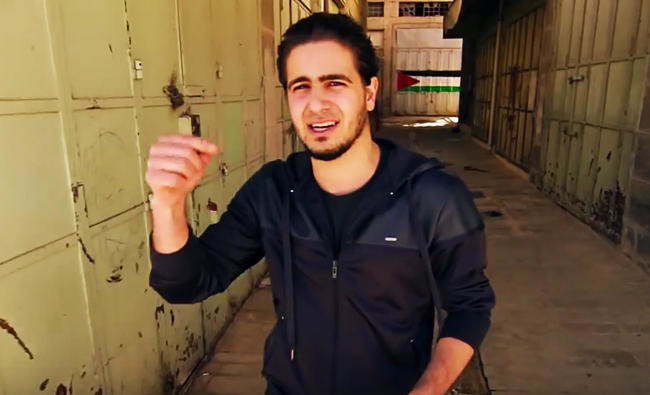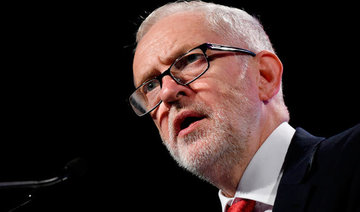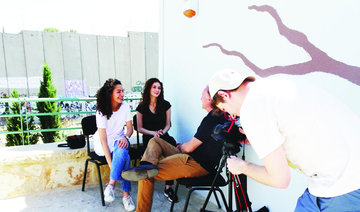LONDON: Palestinian rapper Asifeh’s music video, filmed in a city known to Arabs as Al-Khalil and to Israelis as Hebron, opens with a scene of shuttered shops and cinder block buildings.
“Imagine a whole nation on your land, fully armed and wanting you to leave… and you’re just sitting on the couch, your only hope is your bank account,” he said, staring unblinking into the camera.
Comments on the music video, which has more than 20,000 views, reveal the global reach of Palestinian hip hop. “Peace from Egypt,” reads a note from one fan. “Respect from Turkey,” said another.
Spitting bars of lyrics into microphones across the West Bank, Gaza and beyond, rappers are using their art to highlight the effects of the Israeli occupation and convey the Palestinian struggle to the world.
“It’s like a soundtrack to the struggle, to revolution,” said Asifeh, who prefers to use his rap name. “It’s also a way for people to assert their freedom by saying what’s on their mind.”
His first song, written while he was a housebound youth during the second intifada (uprising), was named after the Israeli flares that lit up the night sky. With tanks rolling through the streets, Asifeh spent most of his time indoors and began writing rap.
For a rapper whose lyrics address colonization, migration and inequality, it is only natural that he should be reflecting these days upon the Balfour Declaration, the letter written 100 years ago by Britain’s then- foreign secretary, which paved the way for the creation of Israel.
“There is a sense of urgency. It’s been 100 years already and you know, look at what is still happening as a result of that,” Asifeh, who is based between Ramallah and Vienna, told Arab News.
“The fact that you have Prime Minister Theresa May and the British government wanting to celebrate, saying they’re proud of this — it’s very shameful, and it also shows that on that level nothing has changed.”
Spoken-word artist and rapper Mohammad Jamil, based in Ramallah, said the suffering he sees every day, from arrests to killings, serves as an inspiration for his work.
“It makes us flow from pen to paper to describe the situation and to express our feelings and create a dialogue with our audience around the world to be aware of our cause and our rights,” he said.
But Rafiq Hamawi, a beat-maker, activist and rapper based in Nablus, said that occupation is just one of a host of social issues local rappers should bring to the fore.
“I see rap as more effective in fighting internal oppression,” he said. “Using rap in Palestine would be more successful in fighting the tyranny from the Palestinian officials or the corruption that we see,” he said.
Away from the heat of the conflict, Arab rappers in the diaspora negotiate how to address the Palestinian struggle without overpowering local voices or capitalizing upon their suffering.
“I would say the dream of justice for (the) Palestinian people and land is inspiration for my work, (but) their struggle is not to be appropriated,” said Yassin Al-Salman, a Montreal-based rapper better known by his stage name, Narcy.
Al-Salman, whose political commentary extends beyond the microphone to op-ed pages and university lecterns, said the Palestinian struggle has helped unite Arabs.
“Palestine is an important part of Arab identity,” he told Arab News. “I see the nation as our challenge to stand together, to put aside our differences and difficulties in unifying, for humankind.”
Lyrical resistance: Rappers address Palestinian struggle from behind the mic
Lyrical resistance: Rappers address Palestinian struggle from behind the mic

IAEA chief identifies Isfahan as Iran’s planned uranium enrichment site

- Day before Israel launched its military strikes, Iran announced it had built a new uranium enrichment facility, which it would soon equip and bring online
- Israel’s attacks on Iranian nuclear facilities destroyed one of those plants and put another out of action by killing its power supply
VIENNA: UN nuclear watchdog chief Rafael Grossi on Thursday identified Isfahan, home to one of Iran’s biggest nuclear facilities, as the location of a uranium enrichment plant that Iran said it would soon open in retaliation for a diplomatic push against it.
The day before Israel launched its military strikes against Iranian targets including nuclear facilities last Friday, Iran announced it had built a new uranium enrichment facility, which it would soon equip and bring online. Tehran did not provide details such as the plant’s location.
Iran’s announcement was part of its retaliation against a resolution passed by the International Atomic Energy Agency’s 35-nation Board of Governors declaring Tehran in breach of its non-proliferation obligations over issues including its failure to credibly explain uranium traces found at undeclared sites.
Had it gone online, the new enrichment plant would have been the fourth in operation in Iran. But Israel’s attacks on Iranian nuclear facilities destroyed one of those plants and put another out of action by killing its power supply, the IAEA has said.
“There was an announcement, quite coincidentally, on the eve of the start of the military operation by Israel of a new enrichment facility in Isfahan, precisely, that we were going to be inspecting immediately, but this inspection had to be postponed, we hope, because of the start of the military operation,” Grossi said.
He did not say where exactly in Isfahan the planned plant was, but he said the nuclear complex there is “huge.”
The IAEA has previously reported that Israeli military strikes on Friday damaged four buildings at Isfahan, including the Uranium Conversion Facility that transforms “yellowcake” uranium into the uranium hexafluoride feedstock for centrifuges so that it can be enriched.
Grossi told the BBC on Monday that the “underground spaces” at Isfahan did not seem to have been affected. Officials say those spaces are also where much of Iran’s most highly enriched uranium stock has been stored.
The IAEA has not, however, been able to carry out any inspections since the strikes.
Jordan FM holds talks with French, Irish, Slovak counterparts on Gaza crisis, Iran tensions

- Ayman Safadi says negotiations between Israel and Iran ‘the only way to protect the region from the expansion of the war’
- Foreign minister praises France, Saudi Arabia for co-leading efforts to organize global forum on two-state solution
AMMAN: Jordan’s Minister of Foreign Affairs Ayman Safadi held a series of discussions on Thursday with European counterparts from France, Ireland, and Slovakia, focusing on efforts to end the escalating crises in the Middle East and revive diplomatic paths toward peace.
In Paris, Safadi met with French Minister of Europe and Foreign Affairs Jean-Noel Barrot, with the two ministers stressing the urgent need to de-escalate tensions between Israel and Iran and resume negotiations as “the only way to protect the region from the expansion of the war and its dangerous repercussions.”
Safadi welcomed talks planned for Friday in Geneva between France, Germany, the US, and Iran, expressing hope they would give diplomacy a chance to resolve the Iranian nuclear issue, the Jordan News Agency reported.
Both he and Barrot also called for intensified international efforts to secure a permanent ceasefire in Gaza, and ensure the immediate and sufficient delivery of humanitarian aid.
Safadi said the inhumane reality in Gaza, marked by massacres, starvation, and collective suffering, must end, and warned that illegal Israeli measures in the West Bank are further eroding chances of a viable two-state solution.
He reiterated Jordan’s backing of the 2002 Arab Peace Initiative and called for international recognition of the state of Palestine, saying such a move affirms the “inevitability” of the two-state solution as the only path to a just peace.
Safadi also praised France’s “key” role in co-leading efforts, alongside Saudi Arabia, to organize an international conference on the two-state solution, which had been postponed due to the recent Iran-Israel escalation.
The ministers also addressed the situation in Syria, highlighting the need for a unified approach that supports Syria’s sovereignty, eliminates terrorism, ensures refugee return and lays the groundwork for reconstruction.
They reaffirmed their commitment to Lebanon’s stability and the wider humanitarian mission in Gaza.
In a separate phone call with Irish Minister of Foreign Affairs Simon Harris, Safadi discussed similar themes, with both stressing that ending the war and resuming nuclear negotiations with Iran were essential to resolving broader regional instability.

They called for enhanced UN humanitarian access to Gaza and warned against actions in the West Bank that could jeopardize the two-state solution. Safadi thanked Ireland for its longstanding support of Palestinian statehood and rights in line with international law.
Later in the day, Safadi also held talks with Slovak Foreign Minister Juraj Blanar. The pair echoed concerns over regional escalation and underlined the urgency of a ceasefire in Gaza.

Safadi and Blanar also explored ways to deepen ties and expand cooperation between Jordan and the EU, reaffirming a shared commitment to regional peace and security.
Israel changing ‘the world’ with Iran war: Netanyahu

- The Israeli prime minister welcomed ‘all help‘ in destroying the Islamic republic’s nuclear sites, in an apparent nod to the US
JERUSALEM: Israeli Prime Minister Benjamin Netanyahu said Thursday that Israel was “changing the face of the world” in its war with Iran, as he welcomed “all help” in destroying the Islamic republic’s nuclear sites.
“I said that we’re changing the face of the Middle East, and now I say we’re changing the face of the world,” he told public broadcaster Kansas
Seven days into the war, Netanyahu said Israeli forces were ahead of schedule in their offensive against Iranian nuclear and missile sites, but refused to provide a clear timeline for an end to the most intense confrontation in history with arch foe Tehran.
“We are at war. I’m not going to reveal our timeline. I’m not going to tell them (the Iranians) what we’re preparing,” said Netanyahu.
“When you enter a war, you know when it begins, but not when it ends,” he added.
He said Israel had already destroyed “more than half” of Iran’s missile launchers and was “capable of striking all of Iran’s nuclear facilities.”
But, in an apparent nod to key ally the United States, Netanyahu added: “All help is welcome.”
During his interview with Kan, Netanyahu went on to say that US President Donald Trump “will do what is good for for the United States, and I will do what is good for the State of Israel.”
Following the remarks, Trump offered a fresh timeline for a possible US intervention in the conflict, saying in a statement that he would decide whether to attack Iran within the next two weeks due to a “substantial” chance of negotiations.
Ukrainian in Israel to treat sick daughter killed in Iran strike: mayor

- The city of Bat Yam identified the victim as Maria Peshkarova, 31
- Peshkarova had traveled to Israel in 2022 on a medical visa to seek life-saving treatment for her daughter, 8
JERUSALEM: The body of a Ukrainian mother who had traveled to Israel for her daughter’s leukemia treatment was recovered on Thursday from a building struck by an Iranian missile four days earlier, Israeli officials said.
The city of Bat Yam, close to Tel Aviv, announced that “in the past few minutes, a body was found at the site of the missile impact,” identifying the victim as Maria Peshkarova, 31, also known as Marina.
Peshkarova had traveled to Israel in December 2022 on a medical visa to seek life-saving treatment for her daughter Anastasia, 8, who was killed along with her grandmother in the destroyed apartment bloc in Bat Yam, according to the mayor’s office.
Peshkarova’s husband is fighting in Ukraine’s war against Russia, according to the Israeli news website Ynet.
Israeli authorities had previously released the names of eight people killed in the strike and had stated that one person was missing.
Peshkarova’s confirmed death takes the total deathtoll in Israel to 25 since the war with Iran started on Friday, according to authorities.
Ukraine’s Ministry of Foreign Affairs announced Sunday that five of its nationals were killed in the Iranian strike on Bat Yam near Tel Aviv, including three minors.
Ukraine on Tuesday urged its citizens to leave Israel and Iran as soon as possible amid the spiralling conflict between the two countries.
Israel restarts limited gas exports amid ongoing conflict, Egypt still waiting

- A ministry spokesperson said exports are now resuming “from surpluses, after domestic needs are met“
- An energy ministry source said most of the limited exported gas is currently flowing to Jordan
CAIRO: Israel has resumed limited natural gas exports from surplus supplies, the country’s Energy Ministry said on Thursday, nearly a week after shutting down two key offshore fields as Israel and Iran waged an air battle.
A ministry spokesperson told Reuters that exports are now resuming “from surpluses, after domestic needs are met.”
An energy ministry source said most of the limited exported gas is currently flowing to Jordan, and only “tiny volumes” reached Egypt this week.
Egyptian fertilizer producers, who were forced to halt operations due to the supply disruption, told Reuters they have yet to receive any gas but expect flows to resume next week.
The Egyptian Petroleum Ministry did not immediately respond to a Reuters request for comment.
Following military escalation in the region, Israel halted exports on June 13 after closing the Leviathan field, operated by Chevron and the Karish field operated by Energean. Only the Tamar field has remained operational, supplying mainly domestic demand.
Israeli Energy Minister Eli Cohen said on Wednesday that exports would only resume once military authorities deemed it safe.
“I don’t want to use our strategic storage, so therefore, I needed to cut exports,” he told Reuters.
Egypt, which has increasingly relied on Israeli gas since a domestic production decline in 2022, is scrambling to compensate for the supply gap.
The country has ramped up fuel oil use in power plants and has signed deals to import over $8 billion worth of liquefied natural gas, while preparing additional floating regasification units.
Israeli gas typically accounts for up to 60 percent of Egypt’s total gas imports and around a fifth of its total consumption, according to data from the Joint Organizations Data Initiative (JODI).






















